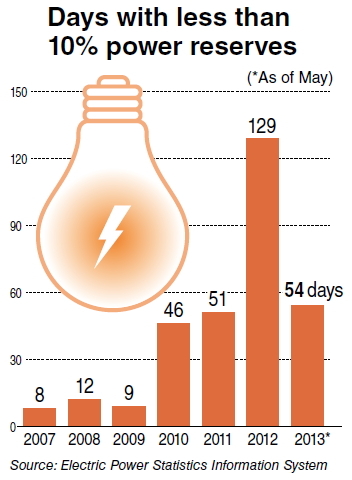
Conglomerates that use huge amounts of electricity to manufacture goods are likely to see a threefold rise in their electricity bills for some periods this summer.
The Ministry of Trade, Industry and Energy is considering the expansion of its “critical peak pricing” program to big companies in a bid to manage power demand. The program already covers small companies and households.
Under the CPP program, applicants will be charged higher electricity tariffs during peak hours (usually 3 to 5 p.m.) on certain days, while getting discounts at other times and days.
The measure has been discussed as a follow-up to brace for power shortages, caused by the recent shutdown of multiple nuclear reactors. The nation’s first CPP program was run at peak hours for 10 days between January and February this winter.
“The second CPP program will be run between July and August this year and subjects will be expanded to bigger companies,” senior ministry official Kim Jong-chul said.
Previously, the program was applied on a voluntary basis to small companies or individual power users whose contracted electricity supply ranges between 300 kilowatts to 3,000 kilowatts.
“The upper limit has not been fixed yet, but it is expected to go beyond 10,000 kilowatts,” Kim said.
Even though the upper limit will be moved up, the biggest electricity spenders like steel companies will not be eligible for the program. Those big users’ electricity consumption usually goes beyond 30,000 kilowatts.
Despite concerns from the corporate world over rising power bills, industry watchers said it was difficult for big companies to avoid being a main target for the government’s power demand management drive, given that companies use about 50 percent of the nation’s power, followed by commercial buildings (20 to 30 percent) and households (15 to 18 percent).
In addition to the CPP program, the ministry is expected to set the indoor cooling limit at 26 degrees Celsius for large scale office buildings, while ordering office buildings of state-run companies to keep indoor temperatures above 28 degrees Celsius.
The road map for the country’s power demand management will be released Friday after a regular policy coordination meeting chaired by Prime Minister Chung Hong-won. The goal of the roadmap is to maintain reserve power at 4 million kilowatts, the ministry said. Chung is due to make a public statement to appeal to them to join the energy-saving campaigns.
By Seo Jee-yeon (
jyseo@heraldcorp.com)








